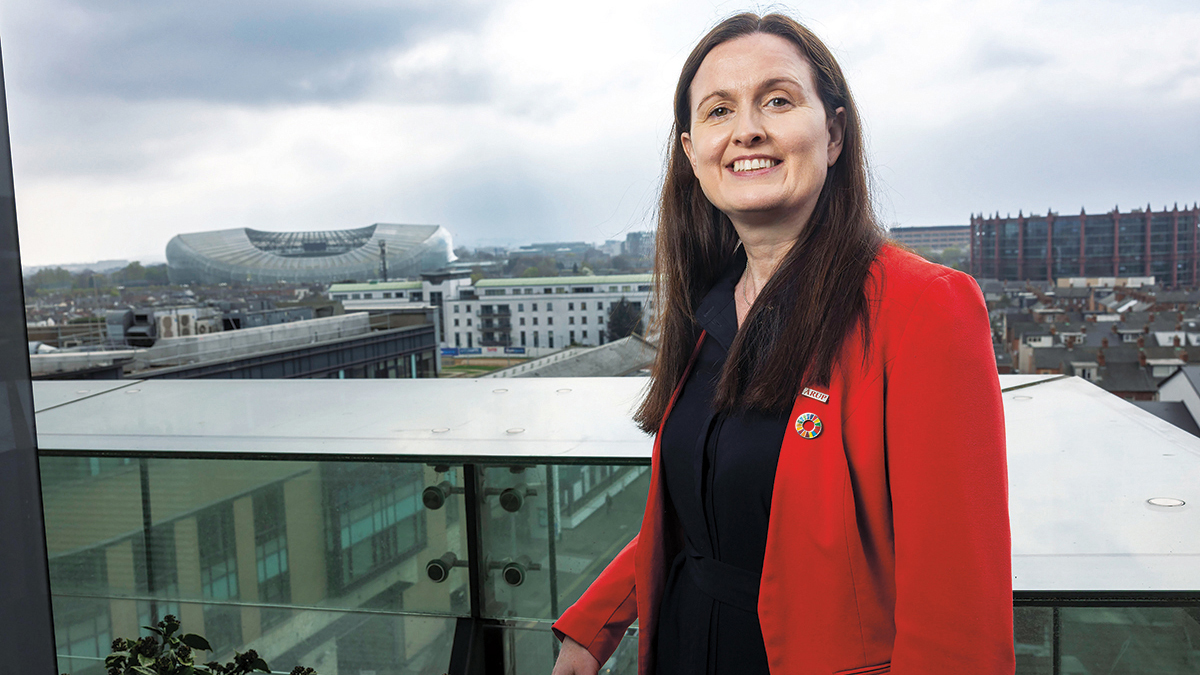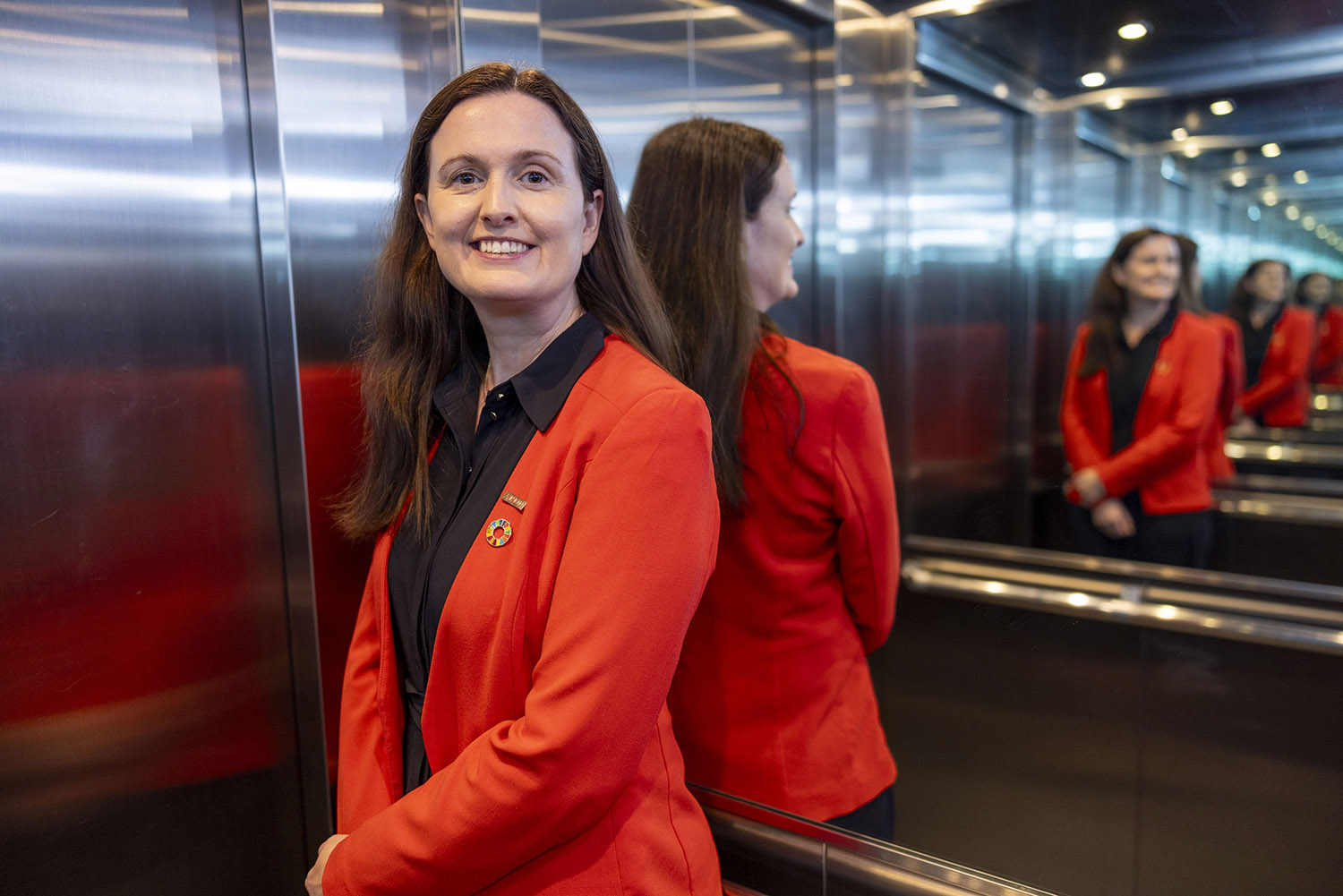INTERVIEW
Alice Charles: There’s a deficit in human capital in the public sector
After almost a decade abroad, including a stint at the World Economic Forum, the Fermanagh woman believes we must tackle the structural issues in our system if we are to tackle the issue of housing, writes Killian Woods

Since her college days studying urban planning, Alice Charles has been used to having many projects on the go. Back then she juggled three part-time jobs with her studies at Queen’s University Belfast; in her professional life, not much has changed.
The roles she has now, however, have put the woman from Fermanagh at the centre of key work on the future of development and city planning being led by groups including the United Nations, the European Commission and World Economic Forum (WEF) in Davos.
For a decade, Charles did that work from Geneva in Switzerland, but in 2022, she came back to Ireland to join Arup, a consultancy working on many key Irish infrastructure projects, including the new children’s hospital and Metrolink.
Few people working in the country right now have the global insight possessed by Charles, who led the WEF’s cities and infrastructure unit for eight years and curated part of its renowned Davos summit
In her years overseas working with leaders and mayors of the biggest countries and cities, Charles saw how they tackled their housing and infrastructure challenges. She feels her work abroad has helped her to pinpoint Ireland’s shortcomings.
“What I see here, as somebody living back in Ireland a couple of years, is piecemeal interventions, rather than a holistic approach,” she said. “I feel what we keep doing in Ireland is saying it’s a planning problem, and that’s so easy to say. Planning is part of it, but we don’t look at the issue systemically.
“Do we have a long-term plan to address housing? Are we addressing vacancy? Are we addressing short-term lets? Are there assets that sit vacant purely because you have an international investor that wants to hold an asset in that currency?”
She added that because Ireland isn’t addressing the “immediate issues”, it cannot begin to get to grips with medium-term issues like “unlocking” stalled new development projects and long-term issues, such as zoning land for the future.

To address your crisis, you immediately work with what you have

“I talk a lot about what a crisis is, and how you approach addressing a crisis. To address your crisis, you immediately work with what you have. We not only have all of these vacant housing units, we have derelict sites,” she said.
“We have commercial real estate where that use is no longer viable. We definitely have a big emerging issue with stranded assets because many offices aren’t desirable because of low energy ratings.
“That’s where you start addressing your crisis. A crisis is right here, right now. You don’t have time to get land zoned and get planning. You need to work with what you’ve got built, and in this country, that’s where you put your energy first.”
Lack of decision-making
During her years with the WEF, Charles didn’t quite take her eye off Ireland. Across several years she worked closely with the National Asset Management Agency (Nama), acting as an external board member to its planning advisory committee.
In 2012, prior to working for the WEF, she was also part of the Irish EU presidency team, advising on issues related to environment, community and local government.
Charles has observed how “an incredibly centralised system of Irish government”, in comparison to other countries, has constrained local authorities from building infrastructure projects.
“We’re up there with Hungary in terms of how centralised we are. We have a local authority system that is not empowered and doesn’t have the ability to generate its own revenues or borrow finance. It’s completely reliant upon handouts,” she said.
“If you’re thinking about that long-term vision for the country, it needs to be both bottom-up and top-down. I also see a reliance on the private sector to solve our problems, but we all know that the private sector will only deliver housing when it’s financially viable. So in boom times, they can borrow, they’ll deliver housing. In bust, they won’t.”
In Charles’s recent work with Arup, which is working across major Irish transport projects, she feels she has seen up close why Ireland has faced issues progressing major infrastructure projects.
“In my previous job in the World Economic Forum, I worked with governments across the world, national and city-level government. I see a fear factor in all arms of government here,” she said.
“What we’re slower at doing is making a project shovel ready. We don’t have the leadership that will make a decision. At the moment, it seems you’re not rewarded for making a decision in your career in civil service or government. So why would you?
“You don’t want to be hauled before a parliamentary committee to tell you that you’ve done such a bad job of overspending. So if you just sit still, you become a minister, you commission a report, you don’t make a decision, then you probably will have a career.”
Charles added that some of the best politicians she has come across are those who target being in government for one term, as opposed to a career.
“They wanted to change something. They didn’t want to be a career politician. I think that we have politicians fearful to make decisions.”
Fear factor
The “fear factor” that has impacted progress on infrastructure in this country has come about due to a lack of expertise at the highest levels of government, according to Charles.
She said there is a “deficit in human capital in the public sector”.
“What I mean by that is that in a lot of other governments, the senior minister is the elected representative and the junior minister is an appointed expert, so it’s somebody with considerable expertise,” she said.
“Last month, someone I know texted me to say he was becoming a junior energy minister in Europe. The guy knows everything about financing energy infrastructure.”
Charles said there is a lot of expertise in Ireland delivering large projects, such as data centres and pharma plants, and it is not utilised enough by the state.
“The people that they’re putting in as their advisers are communications people. In Europe, when you sit down with the central government, you’re sitting opposite somebody with expertise in that discipline,” she said.
“What is remarkable in Ireland is quite often you’re sitting opposite somebody with an arts or history degree who has no background in design, financing or infrastructure, and not very long ago they were in another government department. So expertise isn’t valued,” she said.
“That’s why there is a fear factor. If somebody asked me to give a history lesson in a school, I would have massive imposter syndrome and I would be so risk averse. So I think the fear is related to the expertise issue.”
CV: Alice Charles
2001-2005: Planner at Avison Young
2005-2011: Dublin Office and Planning Manager at Jacobs
2010-2020: External Board Member of Planning Advisory Committee at National Asset Management Agency (Nama)
2011-2012: Director at Alice Charles Planning
2012: Parliamentary Assistant & Researcher for Catherine Murphy TD
2012-2013: EU Presidency Environmental Officer at Department of Environment, Community and Local Government
2014-2022: Lead for Cities, Infrastructure & Urban Services at World Economic Forum
2022-present: Global Leader Strategic Partnerships & Director Cities, Planning & Design at Arup